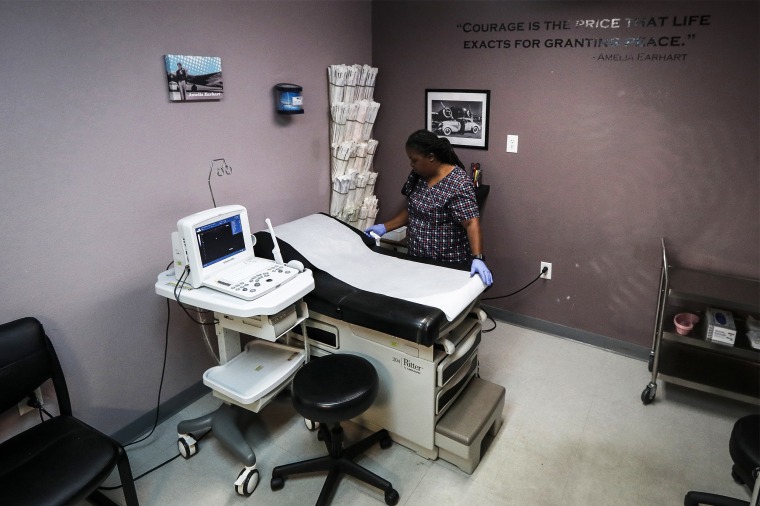One of the largest women’s health providers in Texas said it resumed abortions after a federal judge issued a temporary injunction blocking the enforcement of state’s ban on most abortions.
"We were able to provide abortions today," Amy Hagstrom Miller, founder and CEO of Whole Woman's Health, said Thursday afternoon on MSNBC.
Texas law still requires a mandatory counseling session and ultrasound, plus a 24-hour waiting period. Anticipating a possible injunction, Miller's organization had worked with some clients to complete those requirements, she said, allowing them to have the procedure immediately. "Today we're also consenting people who hope to be able to come in tomorrow and subsequent days," she said.
A federal judge granted the Justice Department a temporary injunction Wednesday evening blocking the enforcement of the law, prompting the clinic to resume performing abortions — particularly for those who have been on a waiting list.
“While we breathe a deep sigh of relief today that a federal judge has blocked this enforcement of the horrific law, we’re carefully considering how we can resume abortion care, up to the form of a limit of 18 weeks that we went to prior to [the law passing],” Miller said. “We should be able to again provide abortions.”

U.S. District Judge Robert Pitman issued the temporary injunction order, saying the Texas law, known as Senate Bill 8, "contrived an unprecedented and transparent statutory scheme" to enact a near-total ban on abortions in the state. The state swiftly filed notice that it would appeal the ruling.
The law prohibits women from obtaining abortions if fetal cardiac activity can be detected. In most cases, that is around six weeks, when many women are not yet aware that they are pregnant. Unlike other states' anti-abortion laws, Texas' ban allows private citizens to enforce the law by suing violators — entitling them to at least $10,000 in damages per defendant if they are successful.
Miller said her clinic has “turned away hundreds of people” since the Supreme Court declined to blockthe enforcement of the law last month.
“We provide abortions for the few that we can under this new scheme, the folks who get us early enough, who get to us, who are lucky enough to make it,” she said. “As for those who were denied, they've been stunned, often leaving our clinics unable to plan for other options because of their shock."
Miller also said the physicians at the clinic are performing abortions, but some have been hesitant, fearing they could be retroactively sued if the injunction fails. Last month, for instance, an Arkansas man sued a Texas abortion provider who publicly admitted to performing an abortion that was illegal under the new law.
“We have some physicians who are comfortable doing abortions today with this injunction,” she said.
But, she added, “many of our physicians have opted out of providing care while S.B. 8 is in effect, it being just too risky for them to do so.”

